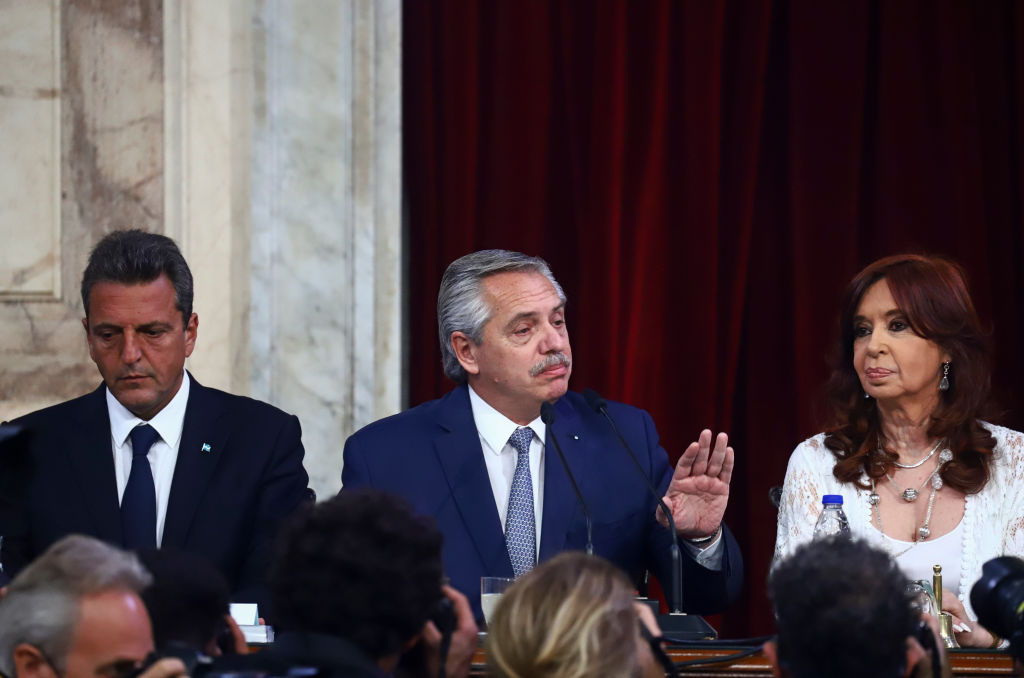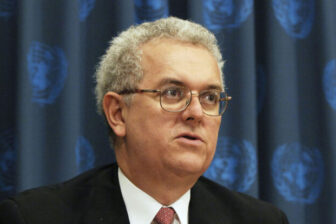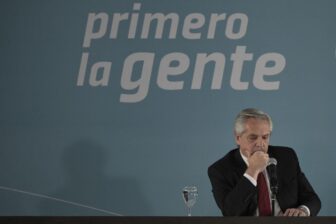BUENOS AIRES — Argentina has had three economic ministers in a month. Martín Guzmán unexpectedly resigned on July 2, after he lost the support of politicians close to powerful Vice President Cristina Kirchner. His successor, former Buenos Aires province economy minister Silvina Batakis, served as a placeholder. Neutral to both sides of the fractured Peronist governing coalition, she bridged the gap left by Guzmán’s departure and absorbed some of the blame for the dismal market reaction that followed.
Sergio Massa, president of the lower house and Cristina Kirchner’s former cabinet chief, was supposed to take over the ministry from Batakis after the July inflation print—expected at an 8% monthly rate—to avoid overshadowing his star entrance with bad news. But a deepening crisis brought forward the announcement of his appointment as economy “super-minister” to July 28. As of this writing, he still has to confirm his team and his program, which will include a consolidation of roles.
Underlying this baffling game of musical chairs is a clearer narrative. Batakis and Guzmán both proposed eliminating Argentina’s costly energy subsidies to reduce the deficit, as well as accelerating the slow crawl of the administered exchange rate and tightening monetary policy to preserve foreign reserves and contain inflation. Both faced political resistance from the kirchnerista faction and indifference from the central bank and the secretary of energy.
Massa, a politician rather than an economist, has presumably been empowered by Cristina Kirchner to move forward with the same adjustments. Why her change of heart? One explanation is sheer panic: Kirchner had been playing a perilous game of attrition, intent on detaching herself from unpopular albeit inevitable policies, but now understands that pushing the government into the abyss will bring her down as well. Why “presumably”? Because none of the three policy variables that need to be corrected—subsidies, the exchange rate and the interest rate—will be in the hands of Massa’s team.
Truth be told, the central bank did hike interest rates last week, but the expected acceleration of inflation in July will likely show that monetary policy is still behind the curve. Moreover, the government has already lost the battle on subsidies this year, along with plenty of fiscal resources, and seems reluctant to devalue the exchange rate, a move often regarded as political capitulation.
Paradoxically, political fears associated with the upcoming 2023 presidential election triggered the changes in the economy ministry in the first place—but those fears will also likely put a cap on the progress that can result from the changes. Massa is a populist with presidential ambitions; as congressman, he fed the fiscal deficit with tax exceptions and a social security moratorium. He is unlikely to do much in terms of adjustment when he is the one likely to pay the political cost.
And in the improbable event that he does, Cristina Kirchner will be tempted to press to resume the spending spree as soon as the financial stress subsides, limiting any near-term upside. Thus, the best-case scenario is a mild, short-lived rebound followed by a muddling through until mid-2023, when expectations will shift to the next administration. The worst-case scenario is hard to fathom, now that the government has depleted its bench.
(There must be a word in German that denotes the irrational faith in a miraculous savior in times of despair. Was it Jacques Lacan who said that we all become believers in the face of death?)
You had three jobs
It has been said before that the conditionality in the IMF’s Extended Fund Facility (EFF) program with Argentina were exceptionally light. Perhaps the Fund acknowledged the government’s unwillingness or inability to change course and settled for a bridge to a new administration with which it can talk business. But the program did include non-trivial fiscal and monetary targets. It required a fiscal consolidation that, compared with the “passive” fiscal deficit—what would have resulted from the status quo ante—entailed an adjustment of close to 2% of GDP, mostly through a reduction in subsidies. It also placed a floor on net reserves that implied a real depreciation of the peso.
And yet, so far this year, the government has moved in the opposite direction.
While prices in the first seven months of the year rose by close to 44% and the U.S. dollar appreciated 10% globally, the official exchange rate depreciated only 26%, in an attempt to contain inflation—temporarily—by abusing the dollar anchor.
This creates a paradox. The misalignment of the official dollar depletes reserves: Firms cancel foreign currency debts, under-invoice exports and over-invoice or anticipate imports. The lack of reserves forces the central bank to ration access to official dollars, pushing importers to the parallel market (the legal “blue chip” exchange rate obtained via stocks or bonds that trade in both the foreign and the local currency). As a result, unlike in previous years when the parallel exchange rate had a very low pass-through to prices, inflation now looks increasingly to the blue-chip exchange rate, defeating the purpose of the dollar anchor.
On the fiscal side, in part due to higher energy prices after the Russian invasion of Ukraine but mostly due to the lack of any progress on the subsidy front, the deficit has been on the rise. It does not help that higher inflation reduces the government’s room for diluting expenditure, as unions increase the frequency of wage adjustments, social demands for transfers escalate and the market for nominal peso debt shrinks.
The experiment with a “soy dollar” to speed up export redemptions illustrates the government’s modus operandi in the face of the crisis: Instead of correcting the exchange rate or reducing export taxes on the margin, it set up a scheme with cumbersome conditions and insufficient incentives, nullifying the impact of the initiative.
The same can be said of the “tourist dollar,” a channel through which foreign tourists could exchange dollars at the parallel blue-chip exchange rate instead of the black-market rate. (In Argentina, to make things more confusing, the black-market rate is called “blue.”) The idea made sense for digital transactions, so that the visitor could save the cost of carrying bills, but it was made available only for cash exchanges—and encumbered with a heavy burden of bureaucratic forms.
The fact that last week’s interest rate hike, the only meaningful reaction so far, helped contain what looked like an unstoppable parallel dollar suggests that mainstream policies still have some clout. Rather than ill-advised heterodox experiments, the government should favor the classic solutions for a change.
A society without privileges
In a recent interview, Alejandro Katz, a prestigious Argentine intellectual, highlighted the link between privileges and rights to explain Argentina’s growing discontent and despair with the political system. Privilege, Katz says, is the opposite of fairness. And Argentina is a society of privileges.
The chronic fiscal deficit and its associated maladies—the weakness of the peso, over-indebtedness and under-investment, the transience of public policies, a propensity for crisis—are often attributed to the social demands of the poor and disenfranchised. But the truth is that the gap between demands and resources far exceeds those of low-income households and has more to do with the proliferation of privileges.
Subsidies galore (for middle- and upper-class energy consumption, for credit for firms, for state-owned enterprises); tax exemptions, evasion, and informality; trade protection, unequal competition and non-competitive practices; implicit public sector job guarantees; special social security regimes; cheap dollars; excess political spending; fiscal undervaluation of real estate; trade unions’ poor HMOs and buoyant company holdings; et cetera.
There may be justification for each individually, from the right to housing to the need to preserve jobs. Taken together, they contribute to the fiscal mismatch that ultimately defeats the purpose of inclusive growth and feeds into growing social discontent with liberal democracy.
Even worse, privilege distances and polarizes. We naturalize our own privileges into rights, but we are angered by the unfairness of the privileges of others. Privileges are centrifugal: They reward non-cooperative behavior and backroom bargaining; they encourage individuals to benefit at the expense of others. And they come back, as a boomerang, in the form of socioeconomic stagnation from which few can escape to collect their privileges.
The entrenchment of privileges also influences policy responses. Argentina is poor and democratic, and its leaders cannot easily shrug off voters’ demands, even unwarranted ones. Convincing voters to support fiscal balance and market incentives becomes a Sisyphean task in which every individual must give ground. But at the same time, everyone feels they have been treated unfairly and senses that now is the time to collect. In this sense, Argentina remains a sobering lesson for a region engaged in an effort to phase out privileges and broaden rights.
Argentina must stabilize its economy and make it more inclusive, as is often repeated. What is less often said is that to do so, Argentines need to recognize their privileges as such—they must reduce them, put them in order and, eventually, phase them out.
As Katz suggests, the move toward a society without privileges may be Argentina’s only way to mend its social contract. It may also be its ultimate development challenge.








